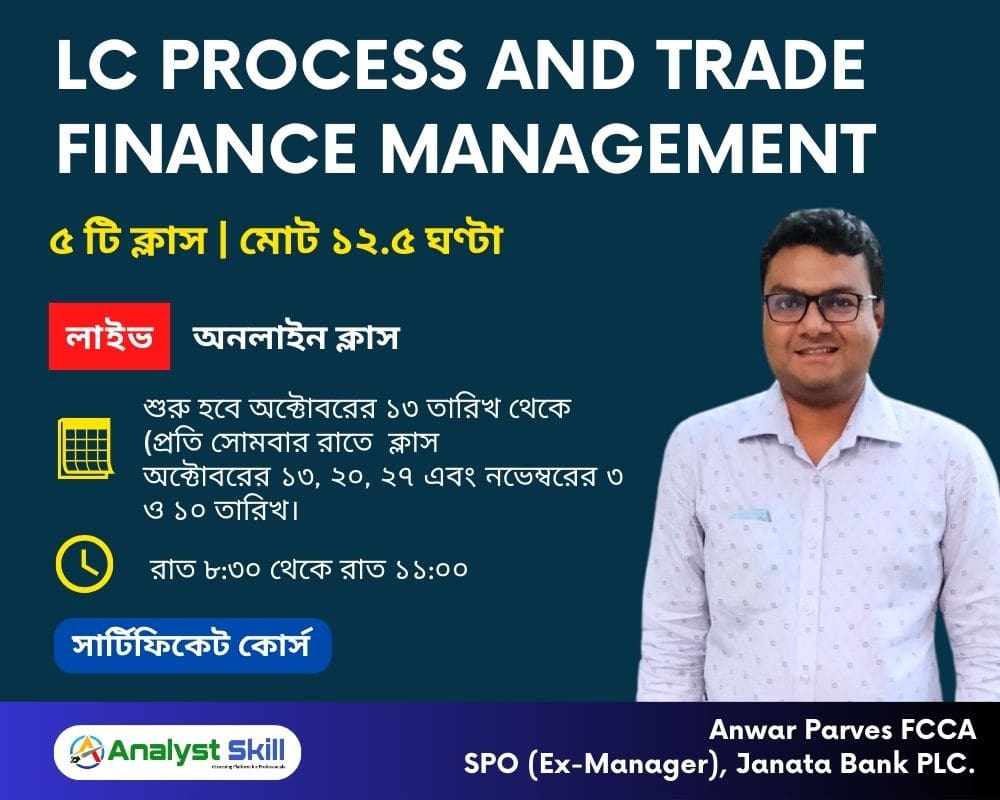What will i learn?
- Understand different payment methods used in international trade.
- Learn and apply key definitions and terms from UCP 600.
- Grasp the legal framework governing international trade finance.
- Identify and differentiate between various types of Letters of Credit (LC) including Revocable, Irrevocable, At-Sight, Deferred, UPAS etc.
- Manage and utilize critical shipping documents such as bills of lading, airway bill, invoices, and certificates.
- Navigate the LC application process, including the use of SWIFT codes and required documentation.
- Learn detailed import procedures, including bonded warehouse operations and UP/UD regulations.
- Master the step-by-step export procedures and apply Incoterms 2020.
- Understand and manage various banking charges related to LCs and trade finance instruments.
- Learn about different finance options for import and export businesses such as PAD, LATR, UPAS, and EDF.
- Utilize advanced trade finance concepts, including customs audits and freight forwarding.
- Apply knowledge through practical case studies to enhance problem-solving skills in real-world scenarios.
- Basic international business knowledge.
- Basic accounting knowledge.
- Basic computer knowledge.
- Willingness to learn and attend classes online.
Module 1: Definitions,
International Payment Modes, LC Types and Legal Frameworks
- Definitions in UCP-600 (Honour, Negotiation,
Reimbursing Bank, Nominated Bank, Presenter, Partial Shipment, Transshipment, HS
Code)
- Legal Framework
- Types of LC (Revocable, Irrevocable, Site, Usance, Unconfirmed, Confirmed, Transferable, Revolving, Standby, Back to Back, UPAS)
Module 2: Shipping Documents
- Sales Contract
- PI and CI
- Packing List
- PSI
- Health Certificate
- Phytosanitary Certificate
- Fumigation Certificate(Paste
Control)
- Certificate of Analysis, BL and
House BL
- Air Way Bill (AWB_
- Shipping Guarantee
- Bill of exchange
- TR
- C/O
- Promissory Note
- IRC
- ERC
- FCL and LCL
- CBM
- Multimodal Through BL
- Clean and Claused BL
-
IRC and ERC Issuance
Module 3: LC Application Process
- LC Application Form
- SWIFT code and Message Type
- Documents Required for LC
Applicant
- LC Procedure in Graphics
- Detail Import Procedure
- Bonded Warehouse
- Import Under UP/UD
Module 4: Incoterms, Cash Subsidy
and Export Procedures
- Cash Subsidy
- Detail Export Procedure
- EDF
- All 11 Incoterms 2020
- FOB, CPT, CIP, CFR, CIF etc.
- Back-to-Back LC Process
Module 5: Bank Charges, Landing
Cost Calculation and Other Customs Related Fees
- All Bank Charges
- LC Opening Charges
- Amendment Charges
- Swift Charges
- Acceptance Commission
- Advising, Confirmation and
Negotiation Charges
- Landing Cost Calculation (CD, RD,
SD, VAT, AIT, and AT)
- Other Customs Fees
- General Regulations
-
UCP 600 Selected Articles
Module 6:Customs Audit, Freight
Forwards, Bill of Lading and Other Issues
- ISBP 745 Selected Rules
- Customs Audit
- SRCC
- Containers
- Bond
- Buyer Searching
- Shipping Lines
- Freight Forwarder
- ERQ
- Rate Sheet
- Cash Incentive
- Scrutiny of documents
- Discrepancy
- SBLC
- Charter Party BL
- Master BLMini Case Study with Solution
- Payment Against Documents (PAD)
- Loans against Trust Receipt (LTR)
- PAD-EDF
- Buyer’s Credit (UPAS)
- Loan General/Time Loan
- Term Loan
- Loan Against Back-to-Back LC
- Export Development Fund (EDF)
- Packing Credit
- Export Bills Purchased
- Export Bills Discounted
- Advance against Export Bills on Collection Basis
Module 9: LC Journals
- Journals for Import through LC
- Journals for Export through LC along with Back-to-Back LC
Anowar Parves FCCA
FCCA | MBM | LC Expert | Banker | Trainer | Professional Accountant | Business Consultant
Banking Treasury LC Management Trade Finance Foreign Exchange Regulations Import Loan Export Loan Credit Analysis- কোর্সটি করে আপনি ভেরিফাইড সার্টিফিকেট পারবেন যা আপনিঃ
- আপনার সিভিতে যোগ করতে পারবেন।
- লিংকডইন প্রোফাইলে এড করতে পারবেন।
- বিডিজবস এর প্রোফাইলে এটাচ করতে পারবেন।
Course Reviews & Ratings(0.00 Out of 5.00)
To stay connect with us and get regular updates, follow our official Facebook page and join our groups:



Write a public review